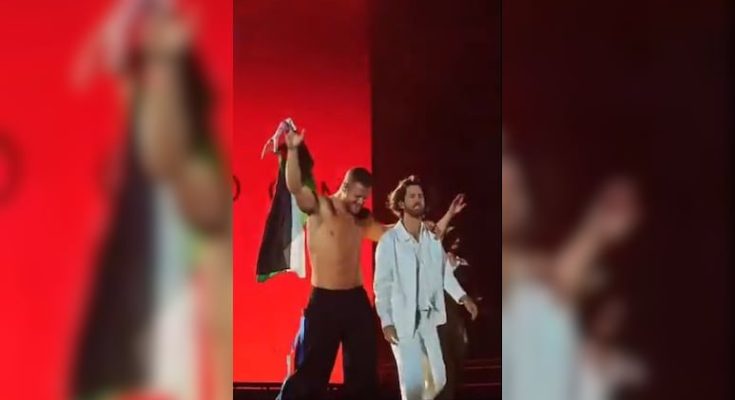The night was supposed to be just another stop on Imagine Dragons’ world tour—a celebration of music, unity, and shared energy. But in Milan, something deeper unfolded. Under the bright lights of the stage, frontman Dan Reynolds took a moment that turned the concert into a defining statement. In front of thousands of fans, he spoke from the heart, addressing a storm that had followed him and his band for months. His words weren’t scripted or polished for headlines; they came from a place of raw humanity. After facing heavy backlash for performing in Tel Aviv earlier in the year, Reynolds made it clear that his compassion, his grief, and his hope for peace extended to everyone—including the Palestinian people.
The Milan crowd, a sea of raised hands and flickering lights, fell silent as Reynolds stepped forward. The energy that moments before had been electric with music now shifted into something reverent. “I believe in love, in empathy, in the power of connection,” he said, his voice steady but heavy. “I want to be very clear tonight—my heart breaks for all the innocent lives lost, no matter who they are or where they live. I stand for peace, I stand for humanity, and that includes my Palestinian brothers and sisters.”
It was a moment that reverberated across social media almost instantly. Fans shared clips of his statement, turning his words into headlines, hashtags, and debates. For many, it was a long-awaited clarification. The band’s Tel Aviv performance earlier in the year had drawn widespread criticism from activists who accused Imagine Dragons of ignoring calls to boycott Israel amid the ongoing conflict in Gaza. The backlash was swift and intense, with social media campaigns labeling them as insensitive and complicit. For weeks, Reynolds had remained quiet, focusing instead on the band’s music and the tour that had taken years to plan. But silence, as he later admitted, had never sat well with him.
Dan Reynolds has always been more than just a rock frontman. Over the years, he’s used his platform to speak about mental health, LGBTQ+ rights, and self-acceptance. His sincerity has earned him both admiration and scrutiny. So when the controversy erupted over Imagine Dragons’ decision to perform in Tel Aviv, many expected him to say something. But as the criticism grew louder, so did the misinterpretations. To some, his silence was complicity. To others, it was restraint. Yet in Milan, Reynolds finally broke that silence—not to defend himself, but to extend empathy to those who had felt unseen.
“I’ve always believed music should bring people together, not divide them,” he continued, pacing slowly across the stage. “But I also understand that when people are suffering, silence feels like betrayal. I want you to know tonight, I see that pain. I see you.” The crowd responded with a thunder of applause and shouts of support. Some fans waved Palestinian flags, others simply held up peace signs, their voices blending into a chorus of unity.
That night, the performance that followed seemed to carry a different kind of energy. Songs like “Demons,” “It’s Time,” and “Whatever It Takes” took on a deeper emotional resonance. Each lyric felt like a reflection of resilience, sorrow, and hope. Reynolds’ voice cracked with feeling more than once, and when the band played “Believer,” it wasn’t just about personal struggle anymore—it was about collective endurance.
The statement made waves far beyond the arena. Major news outlets picked up the story, and fans from across the world debated his message online. Some praised Reynolds for finally addressing the issue with compassion and courage. Others argued it was too little, too late. Still, even his critics couldn’t deny the sincerity of his words. In a climate where public figures often shy away from controversy, his willingness to confront the topic onstage marked a moment of authenticity.
To understand why his statement carried such weight, one must look back at the circumstances that led to it. When Imagine Dragons announced their show in Tel Aviv earlier that year, they were immediately met with a campaign from pro-Palestinian activists urging them to cancel. Many artists have chosen not to perform in Israel in solidarity with the Palestinian cause, citing human rights concerns. Reynolds and his band, however, chose to proceed, explaining that their goal had always been to bring people together through music. “We play for fans everywhere,” Reynolds said at the time. “We don’t believe in punishing fans for the actions of governments.”
The backlash was fierce. Hashtags calling for boycotts trended worldwide. Some fans unfollowed the band, while others defended them, arguing that music should transcend politics. Reynolds found himself in the middle of a global debate—one that seemed impossible to navigate without offending someone. But for the singer, known for his empathy and activism, the real pain came from the idea that anyone believed he was indifferent to human suffering.
In the months following the controversy, Imagine Dragons continued their tour, performing across Europe and the Americas. But those who have followed Reynolds’ career closely knew something was stirring beneath the surface. He’s always been introspective—a man who turns turmoil into art. The Milan speech wasn’t just a reaction to criticism; it was the culmination of months of reflection, an attempt to bridge divides in a world where even compassion can be politicized.
In his brief but powerful statement, Reynolds managed to capture the emotional complexity of a global issue that rarely allows for nuance. He didn’t pick sides; he chose humanity. “You can stand for peace without hating anyone,” he said. “You can support the oppressed without wishing harm on others. That’s what love means—it means everyone.”
His message resonated with many in the audience who had come from different cultural and political backgrounds. In a world polarized by outrage, his words were a reminder that empathy doesn’t require agreement—it requires listening.
After the show, fans flooded social media with messages of appreciation. One attendee wrote, “Dan didn’t have to say anything, but he did. And he said it with love.” Another commented, “He turned pain into peace tonight. I’ll never forget it.” Even some critics softened their tone, acknowledging that his statement was a meaningful gesture.
Yet, as with any act of public conscience, not everyone was convinced. Some argued that his words were too carefully measured, that he could have gone further in condemning specific injustices. Others accused him of trying to please everyone. But perhaps that’s exactly the point Reynolds was trying to make—that in an age of extremes, choosing compassion over condemnation is itself an act of courage.
Throughout his career, Reynolds has faced personal and professional challenges that have shaped his worldview. From his battles with depression to his advocacy for marginalized communities, his art has always been a mirror of his humanity. His connection to his fans has never been about perfection—it’s about honesty. And in Milan, he showed that honesty again, not through a press release or an Instagram story, but through an unfiltered moment on stage.
What makes his gesture even more significant is the context in which it happened. The conflict between Israel and Palestine continues to evoke deep emotions across the globe. Artists who speak up often find themselves walking a tightrope between support and backlash. But Reynolds’ decision to address the issue publicly—after months of silence and criticism—showed that he values integrity over image.



